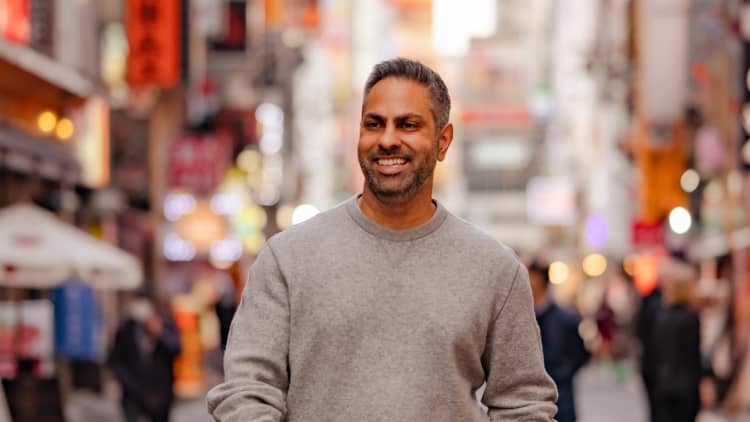Forrest, 40, and Kathleen, 42, live a leisurely life in California.
The couple’s annual income is more than $286,000, which would be enough to live fairly comfortably with their two children. But years of reckless spending left the couple in the red, says Ramit Sethi, a self-made millionaire and author of the upcoming book Money for Couples, on a podcast. He talked about it in the episode. Their last names were not used.
“We’re living on the brink,” Forrest said. “If the income stops coming in, it’s not good from a financial standpoint. You’ll quickly lose everything.”
Credit card debt is a common problem in America, with half of cardholders carrying a balance each month, according to a recent study by Bankrate. Forrest and Kathleen have nearly 10 times more credit card debt than the average millennial, who, according to Experian, have just over $6,500 in debt.
While many Americans can place at least some blame on economic conditions, such as rising prices due to inflation and high interest rates that make it difficult to avoid or get out of credit card debt, Forrest and Kathleen’s case is less so.
“Forest likes skiing and cycling, and I like going to yoga and traveling,” Kathleen said on the podcast. “And I know they’re fun…I value adventure and fun and that kind of lifestyle.”
Here’s how they saved tens of thousands of dollars on the card and Sethi’s advice for couples on how to pay off debt.
“Everything was going to work out in the end.”
There were some big-ticket items that led to Forrest and Kathleen’s debt, including two bikes costing more than $5,000, a trip to Montana, and the aforementioned yoga class and skiing, but the underlying issue is one that guides the couple. Sethi said there was no such thing. their spending principles;
Kathleen said her belief was that “everything will work out in the end” and “try not to worry.”
While it may sound like all you have to do is quit those expensive things and focus on paying off your debt, Sethi says it’s not that easy.
“It’s not just one or two decisions, because if you try to do it simply by decisions, it’s like playing whack-a-mole,” Sethi said. “It’s important to dig deeper. It’s important to understand the principles, not the tactics.”
He guided the couple through several exercises to see how they feel and think about money. They both have anxiety and know their situation is pretty dire, but they don’t ask for help because they don’t want to feel bad about their decisions. They want to feel empowered and proud to be actually wealthy, as their salary and lifestyle indicate.
They say they are committed to making the changes necessary to get there, but they also accept that it won’t be easy.
Clear rules, no gimmicks
Forrest and Kathleen suggested several ideas that may help reduce your debt burden.
You could sell your expensive bike and plan to eat at home instead of at a restaurant, but Sethi reminded us that you need to commit to a simple, practical course of action.
Forest has used balance transfer cards and 401(k) withdrawals to pay off credit card debt. Seti advised him not to do the same thing again.
“There needs to be clear rules, and one of those rules should not be naughty,” he told the couple.
He is helping them sell as much property as possible to significantly reduce their outstanding debt. This includes bicycles, cars, rowing machines, etc. We are taking inventory of all items that caused us to end up in this situation.
Looking to the future, Kathleen said she expects to start working full-time again soon, which will increase the couple’s income. Sethi encouraged them to set some rules for how they would use that extra cash, such as putting a certain percentage toward debt and the rest toward emergency savings. At the time of recording, such things almost didn’t exist.
Sethi also encouraged Forrest and Kathleen to schedule an appointment with a therapist to help them work through their feelings about money and help them communicate better with each other.
“You’re going to backtrack, you’re going to make mistakes, and that’s okay,” Sethi said. “What’s more important is creating a healthy money culture so you can recognize and correct these things whenever they happen.”
Watch the entire episode here.
Would you like to master how to use your money this fall? Enroll in CNBC’s new online course. We teach you practical strategies to hack your budget, reduce debt, and increase your wealth. Start today to feel more confident and successful. Use code EARLYBIRD for a 30% off introductory discount. It has been extended through September 30, 2024 for the back-to-school season.
plus, Sign up for the CNBC Make It newsletter Get tips and tricks to succeed in work, money, and life.

#millionaires #advice #couple #credit #card #debt #cut #spending #WhackaMole